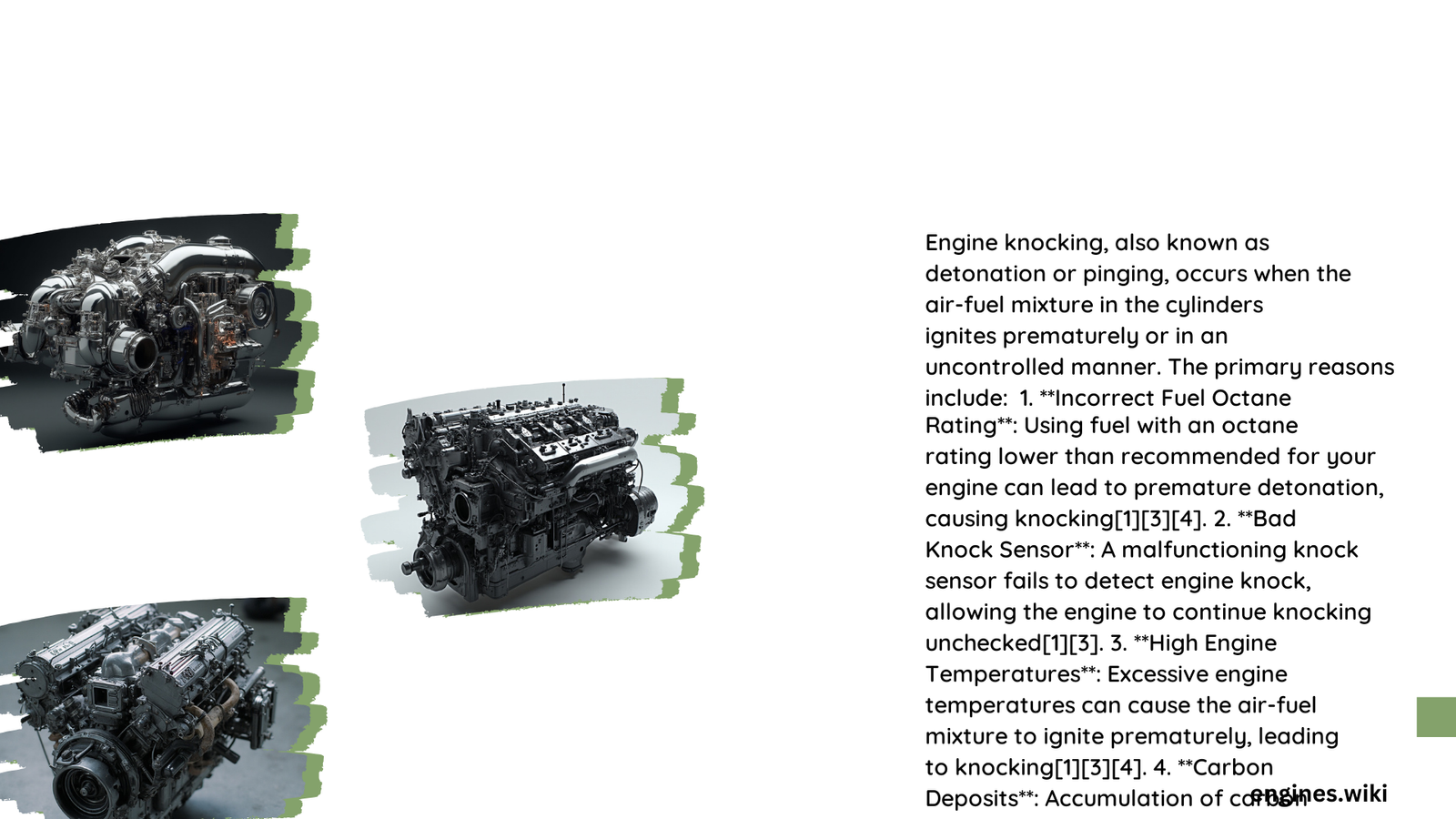Engine knocking represents a complex mechanical phenomenon where abnormal combustion occurs within an internal combustion engine, potentially causing significant performance degradation and potential long-term damage. Multiple interconnected factors contribute to this critical issue, ranging from fuel quality and ignition timing to mechanical component wear and chemical imbalances in the combustion chamber.
What Causes Engine Knock?
Fuel Octane Mismatch
Engine knocking frequently emerges when vehicle owners use fuel with an inappropriate octane rating. Consider these critical insights:
| Octane Rating | Engine Compatibility | Knocking Risk |
|---|---|---|
| 87 (Regular) | Low-compression engines | Low risk |
| 91 (Premium) | High-performance engines | Minimal risk |
| Below recommended | All engine types | High risk |
Key Factors in Octane-Related Knocking
- Premature fuel ignition
- Uncontrolled combustion
- Potential engine damage
Ignition Timing Problems
Incorrect spark plug firing can dramatically increase knocking risks:
- Early Ignition: Sparking before optimal compression point
- Late Ignition: Delayed spark causing incomplete combustion
- Inconsistent Timing: Irregular spark plug performance
Carbon Deposit Accumulation
Carbon buildup creates unpredictable hot spots within combustion chambers, triggering premature ignition. Symptoms include:
- Metallic pinging sounds
- Reduced engine efficiency
- Increased fuel consumption
Air-Fuel Mixture Imbalance
Improper air-fuel ratios significantly contribute to knocking:
- Lean Mixture (More air, less fuel)
- Burns faster
- Generates excessive heat
-
Increases knock probability
-
Rich Mixture (More fuel, less air)
- Incomplete combustion
- Carbon deposit formation
- Reduced engine performance
Mechanical Component Wear
Degraded engine components can induce knocking through:
- Worn crankshaft bearings
- Damaged connecting rod
- Cylinder wall deterioration
- Timing belt misalignment
Temperature and Operating Conditions
Environmental and operational factors influence knocking:
- High ambient temperatures
- Extended high-speed driving
- Consistent heavy load conditions
- Inadequate cooling system performance
Sensor and Electronic Control Issues
Modern vehicles rely on complex electronic systems to manage combustion:
- Faulty knock sensors
- ECU (Engine Control Unit) malfunction
- Incorrect fuel injection timing
- Compromised oxygen sensors
Prevention and Maintenance Strategies

Proactive Maintenance Checklist
- Use recommended octane rating
- Regular oil changes
- Periodic spark plug inspection
- Clean fuel injectors
- Monitor engine temperature
- Address warning indicators immediately
Diagnostic Recommendations
- Professional engine diagnostic scan
- Compression test
- Fuel system evaluation
- Electronic system check
Cost Implications
| Severity | Potential Repair Cost | Long-term Impact |
|---|---|---|
| Minor | $100 – $500 | Limited damage |
| Moderate | $500 – $2,000 | Performance decline |
| Severe | $2,000 – $5,000 | Complete engine replacement |
Final Technical Insights
Engine knocking represents a multifaceted mechanical challenge requiring comprehensive understanding, proactive maintenance, and precise diagnostic approaches.
Professional Recommendation
Always consult certified automotive technicians for definitive diagnosis and resolution of persistent engine knocking issues.
Technical Warning
Prolonged engine knocking can cause catastrophic mechanical failure, potentially rendering the entire engine non-functional.
Continuous Monitoring
Regular vehicle maintenance and immediate response to unusual engine sounds remain the most effective strategies in preventing extensive damage.
References:
1. SAE International Technical Papers
2. Society of Automotive Engineers
3. ASE Automotive Certification Resources
